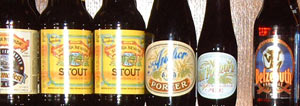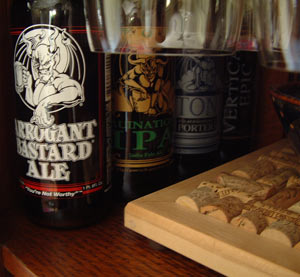SEARCH THIS ISSUE >>> |
SNOB! - A Review of Beer Review Styles
In life it’s good to learn from the mistakes of others. If you do, you can have a better life.
Imagine this scenario. A weary beer traveler sits down in a brewpub and orders their Pilsener on tap and is greeted by a cloudy, high ester, dimethyl sulfide & diacetyl reeking, creamy textured, somewhat sweet and sour beverage. There has most certainly been a mistake, but is it the traveler's mistake? Somebody made the mistake, so there’s something to learn!
 Our hypothetical friend went to what he believed was a brewery. The sign says ‘brewery’. There are fermentation tanks. Plus the place gets rave reviews. Everybody seem to love it.
Our hypothetical friend went to what he believed was a brewery. The sign says ‘brewery’. There are fermentation tanks. Plus the place gets rave reviews. Everybody seem to love it.
Hoping the server was confused -and wishing he’s merely in the company of some crazed style-shifters- he asks, “are you sure this isn’t some sort of cask aged cabbage wheat cream ale? I ordered the pilsener... the light lager”. “That’s definitely the pilsener”, says the bartender.
There is no substitute for experience, except when a reputable source helps you avoid tainting your palate with a sub-par beverage.
Personally, I don’t feel a need to drink blandness. I’m not out to try all the garbage out there just to say I’ve experienced it. But it hurts doubly, because I want my beer drinking dollars to help out the brewers who care about their craft, and every bad beer I drink is money taken from the people I want to support and given to the ‘enemy’. So I naturally get irritated when I’m lured to a place that offers up items similar to the aforementioned scene. Why would a place like this get good reviews?
On the other hand, it’s irritating when a know-nothing slams a good beer just because they weren’t served the way they liked, had a bad day or were offended.
It’s fine to get upset about the poor service if that’s what you received, and it’s great to praise good service, but the purpose of a beer review is to help others know what to expect when they visit. If you’re reviewing the beer, talk about the beer. If you’re reviewing the location, specify. If you were just enjoying yourself and didn’t pay attention, that’s fine too, but you need to write from that viewpoint if you want to be helpful. Please don’t try to retrofit your situation into an “expert” scenario. Even if you are considered to be an expert, perhaps you weren’t being an expert at the time.
The following are examples of beer reviews that aren’t really reviews:
“There was nothing about their beers that I liked” - Okay, what DO you like? Did you just write the review as a personal reminder? That’s what sticky notes are for!
“Everything here is the best I’ve ever had” - If they were ALL the best, what was the best of what you just tried? If you can accurately remember everything you’ve ever had over the course of a lifetime, surely you can come up with a preference regarding the beers you tried in a single evening. And what made them stand out as the best? Which beer exemplifies this quality the most?
“Today we ride, but when we hit Omaha it’s time for some brewskis!” - The fact that you use the term “brewskis” and think of Omaha as your great beer destination puts your memoirs high on my potentially fascinating anthropological literature list, but it’s still not a review.
Of course, there’s nothing wrong with any of those if there is some real data surrounding the conjecture and anecdotes, but the following are a few of the key issues facilitating the glut of reviews out there that make a beer traveler feel that he’s made a mistake:
1 Review sites that seem to be competitions over who can put out the most reviews. Often, it seems the beers haven’t even been tasted by the reviewers.
2 Beer newspapers that are written primarily by people who don’t care enough to sample the beers they think we should try. Many of these papers also feature watered-down reviews that have no useful information because the publishers are afraid of losing advertising revenue by serving the readers.
3 Breweries that review their own beers but don’t know their own beers. There are some breweries that don’t even know what style their beers fit into. They use accolades from past glories and omit data that would help us steer clear. Usually it is a real warning sign if these same breweries have magically glowing reviews that even the best breweries rarely get.
I believe that reviews should still be written in a balanced way, even if all that can be said is negative. I don’t agree with the “if you can’t say anything nice, say nothing at all” crowd. But if it seems that an article is driven by animosity, then how will we divine that the information presented is accurate? We’re going to think it’s a vendetta. So please review with care, single out the real low and high points. Write about your perspective OR reality, but you may want to avoid mixing and matching philosophical metaphors, statistical analysis & biofeedback to tell us that the beer “lacked energy”. All we want to know from a review is whether it’s worth trying ourselves, because a weary beer traveler can’t be everywhere at once. He can only be one place at once and from the looks of the majority of reviews out there, most can’t even be one place at once.
--Thomas Ale Johnson